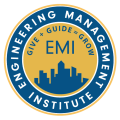In this episode, we delve into the topic of graduate degrees in geotechnical engineering with John Myers, P.E., the design manager for Menard Southern Region in the U.S. Our discussion revolves around the potential career advantages that come with obtaining a graduate degree in geotechnical engineering, and whether the costs of pursuing such a degree are justifiable given the potential benefits.
***You can view the video version for this episode here.***
Engineering Quotes:
Here Are Some of the Questions We Ask John:
- What are some of the advantages of obtaining a graduate degree in geotechnical engineering?
- Do you recommend pursuing a master’s degree in geotechnical engineering immediately after completing an undergraduate degree, or gaining work experience first?
- What are your thoughts on pursuing a Ph.D. in geotechnical engineering, and is it necessary for a successful career in this field?
- What short-term and long-term benefits can be expected from obtaining a graduate degree in geotechnical engineering, and how can they shape a person’s career?
- What advice would you give to someone hesitant to pursue a graduate degree in geotechnical engineering due to financial concerns?
- How important is continuing education in the field of geotechnical engineering, and is obtaining a graduate degree just the beginning of a lifelong learning journey in this field?
- What are some key factors that individuals should consider before enrolling in a graduate program in geotechnical engineering, and what advice would you give to those considering pursuing this path?
Here Are Some of the Key Points Discussed About Exploring the Pros and Cons of Pursuing a Graduate Degree in Geotechnical Engineering:
- Obtaining a graduate degree in geotechnical engineering can provide both short-term benefits, such as a deeper understanding of the subject matter and increased competitiveness in the job market, and long-term benefits, such as career advancement and higher salaries. However, it’s important to ensure that the degree aligns with one’s career goals and interests.
- The transition from undergraduate to graduate school may be easier in terms of lifestyle, but lacking industry experience may hinder the ability to apply real-world knowledge. However, whichever path is chosen, the second degree will benefit from the experience gained in the first. Those who choose to work before pursuing a graduate degree should consider the impact on their personal life and may need to make sacrifices to balance their studies with their commitments.
- Pursuing a Ph.D. should be based on a passion for a specific project or field, rather than just the desire for the title or the belief that it will open doors. While a Ph.D. can make you an expert in a niche field, it may not necessarily translate to practical industry experience or job opportunities. Therefore, it’s important to carefully consider the potential benefits and drawbacks of pursuing a Ph.D. and evaluate whether it aligns with your personal and professional goals.
- Grad school provides opportunities to make connections and gain a deeper knowledge base that can be beneficial in the short and long term of a career. Graduates can use their notes and knowledge to revisit topics and continually expand their expertise over time. But the experience gained from working in the field should not be overlooked, especially in geotechnical engineering.
- Pursuing a specialized degree can come with significant financial concerns, especially if one already has substantial student loans from their undergraduate degree. However, obtaining a graduate degree can also lead to better compensation and access to a network of professionals in the field, which can pay off in the long term. Ultimately, it’s important to consider the potential financial burden as well as the potential benefits when deciding whether to pursue a specialized degree.
- Continuing education is important for professional growth and staying current with the latest research and industry practices. However, not all forms of continuing education are created equal, and it’s important to focus on self-study and attending industry-specific conferences to gain practical knowledge and skills that can be applied in one’s work.
- When pursuing higher education, it’s important to have a clear idea of what you want to get out of it and to treat it like a job, focusing on understanding the topics and gaining applicable knowledge, rather than just completing assignments and passing tests.
More Details in This Episode…
About the Guest: John Myers, P.E.

About the Host: Jared M. Green, P.E., D.GE, F.ASCE

Jared is a consultant and team leader who also enjoys mentoring young engineers and first-generation college students. He has been instrumental in increasing the number of pre-college students who are interested in STEAM majors and fields. He strives to make complex engineering topics relatable and understandable to people new to the field and to people who are completely unfamiliar with engineering. Jared and his family currently reside in Flemington, New Jersey. He and his wife have three energetic, inquisitive, and awesome children. You can connect with Jared here.
Sources/References:
Connect with John Myers, P.E. on LinkedIn
Visit the Menard USA website
Deep Foundations Institute
This Episode Is Brought to You By:
Simpson Strong-Tie

PPI

Please leave your comments or questions in the section below on some of the pros and cons you have experienced of pursuing a graduate degree in geotechnical engineering.






























